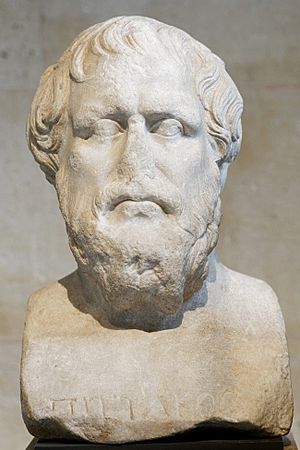Pittacus of Mytilene facts for kids

Pittacus (pronounced PIT-uh-kus; born around 640 BC, died 568 BC) was an important military leader from the ancient city of Mytilene. He was also known as one of the Seven Sages of Greece, a group of wise men famous for their practical wisdom.
Contents
Who Was Pittacus?
Pittacus was born in Mytilene, a city on the island of Lesbos. His father's name was Hyrradius. Pittacus became a general, which means he was a high-ranking military leader.
He led his army to victory in a big battle against the Athenians, who were led by their commander Phrynon. Because of this important win, the people of Mytilene honored Pittacus greatly. They chose him to be their leader, giving him supreme power over the city.
Pittacus ruled Mytilene for ten years. After that, he decided to step down from his position. He made sure the city and its laws were well-organized before he left power.
The Duel with Phrynon
When the Athenians were planning to attack a place called Sigeion, Pittacus suggested a brave idea. He challenged the Athenian general, Phrynon, to a one-on-one fight. The agreement was that the winner of this duel would decide the war, which would save many lives.
Phrynon accepted the challenge. Pittacus managed to defeat and kill his enemy using a broad sword. This single combat prevented a much larger, bloodier war.
A writer named Polyaenus later wrote about this duel in his book Stratagems. He claimed that Pittacus had a secret trick: he hid a net under his shield. He used the net to trap Phrynon, pull him down, and then kill him. Polyaenus suggested that this clever trick by Pittacus might have led to gladiators using nets in their duels later on.
His Family and Wisdom
Some stories say that Pittacus had a son named Tyrrhaeus. Legend tells that Tyrrhaeus was killed. When the person who committed the murder was brought before Pittacus, he chose to let the person go. He famously said, "Pardon is better than repentance," meaning it's better to forgive than to regret punishing someone.
Another wise man, Heraclitus, also spoke about this event. He said Pittacus had the murderer in his power but released him, saying, "Pardon is better than punishment."
Pittacus himself once said, "It is a hard thing to be a good man." This saying was discussed a lot by the famous Greek philosopher Socrates in one of Plato's books, Protagoras. Another philosopher, Prodicus of Ceos, even joked about Pittacus's accent, saying he spoke a "barbarian" dialect because he was from Lesbos and didn't always use words correctly.
Pittacus was an important figure around 592 BC. He lived for more than seventy years and passed away in 568 BC.
What Pittacus Wrote
An ancient encyclopedia called the Suda mentions that Pittacus wrote a book about laws. It also says he wrote a long poem of 600 lines. However, none of these writings have survived to our time.
Pittacus's Famous Sayings
Pittacus was known for his wisdom and shared many important thoughts. Here are some of his famous sayings:
- "Forgiveness is better than revenge."
- "Whatever you do, do it well."
- "Even the gods cannot strive against necessity." (Meaning some things are unavoidable).
- "Power shows the man." (Meaning how a person acts when they have power reveals their true character).
- "Do not say beforehand what you are going to do; for if you fail, you will be laughed at."
- "Do not criticize a man for his troubles, fearing that bad luck may come to you too."
- "Avoid speaking badly not only of your friends, but also of your enemies."
- "Work on being truthful, trustworthy, experienced, clever, friendly, and hardworking."
- "Know your opportunity." (Meaning recognize the right moment to act).
See also
 In Spanish: Pítaco de Mitilene para niños
In Spanish: Pítaco de Mitilene para niños
 | John T. Biggers |
 | Thomas Blackshear |
 | Mark Bradford |
 | Beverly Buchanan |

